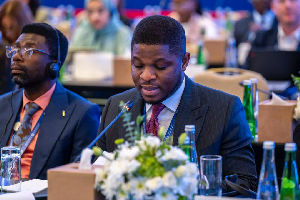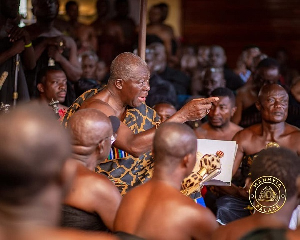The discovery of oil is no doubt the talk of most politicians today irrespective of ones political affiliation. It is good we all talk about the oil because it has raised our hopes as Ghanaians. It is our hope that this oil would create more jobs, alleviate poverty and boost our economy as a nation. But inasmuch as we anticipate all these benefits, we should also arm ourselves against the challenges this oil would present to us as a nation.
For instance, one of the challenges this oil would present is pollution. The prospecting of the oil would lead to environmental pollution especially in its catchment areas. This may have adverse effects on the health of the people. This is because polluted atmosphere and water bodies often bring about strange diseases and ailments. Besides, it would also affect agricultural activities in these areas. Most of the fishes would be polluted whilst the lands would not be able to support good yielding of crops. Moreover, farmers whose activities are close to where this drilling would take place would be banned. This perhaps can lead to scarcity of food and portable drinking water. Already fishermen living in and around those areas have been warned to stay off the area where the oil rigs are anchored.
Beyond this environmental pollution lies the challenge of ownership. There is the tendency for those in these drilling areas to feel that once it is taking place in their jurisdiction they must enjoy greater proportion of the benefits derived. In situations where these local people think that they are being cheated, serious conflict could ensue between them and the prospecting companies.
Also, there is the predisposition of increase in the level of immorality. This is because there would be more money in the economy and this may lead to greed for money. Imagine a hungry person who has got food, he/she wants to eat with both hands. Such is a person who has seen a lot of money for the first time. Many people would like to become rich overnight. This may lead to high level of corruption and bribery if not checked. Besides, because there would be a lot of money in the system, many people may resort to promiscuous lifestyles. Drunkenness and prostitution are likely to increase whilst armed robbery cases may also go up.
Moreover, many people from all walkers of life especially Africa may come to Ghana for businesses. This would increase the population of the country. We should note that population increase has got its own challenges. There would be congestion in areas like Accra, Kumasi, Sekondi Takoradi, Cape Coast and the surrounding areas where this drilling would take place. This may lead to both human and vehicular traffic. Since waste is often associated with areas of high population, filth is likely to engulf these areas if not properly managed.
These challenges as well as others are likely to surface as drilling of the oil begins to take place. This is a wake up call to our MPs, Politicians, Security agencies and all stakeholders. We must not sit on the fence till all these challenges take us by surprise. We must attenuate the culture of “dying minutes’ action” as it happened during the CAN 2008. “The earlier” they say: “is better”. We must treat these issues urgently and collectively without any political differences, since they concern the nation and not any specific political party.
To this extent, I would like to postulate that a committee should be set up to learn from oil countries like Nigeria, Angola, Equatorial Guinea etc the experiences and the challenges that the presence of oil is posing to them as a nation and how best they are solving these challenges. It is often said that: “we learn from our mistakes” But I strongly believe that it is better to learn from other’s mistakes and it is best to learn from the experiences of other people so as to avoid their mistakes and improve upon their strengths to become better off than them. It is only when we are able to do this that this blessing of God (the oil) would not become a curse for us as a nation.
Department of Rel. & Human Values.
University of Cape Coast, Ghana

Views expressed by the author(s) do not necessarily reflect those of GhanaHomePage.














